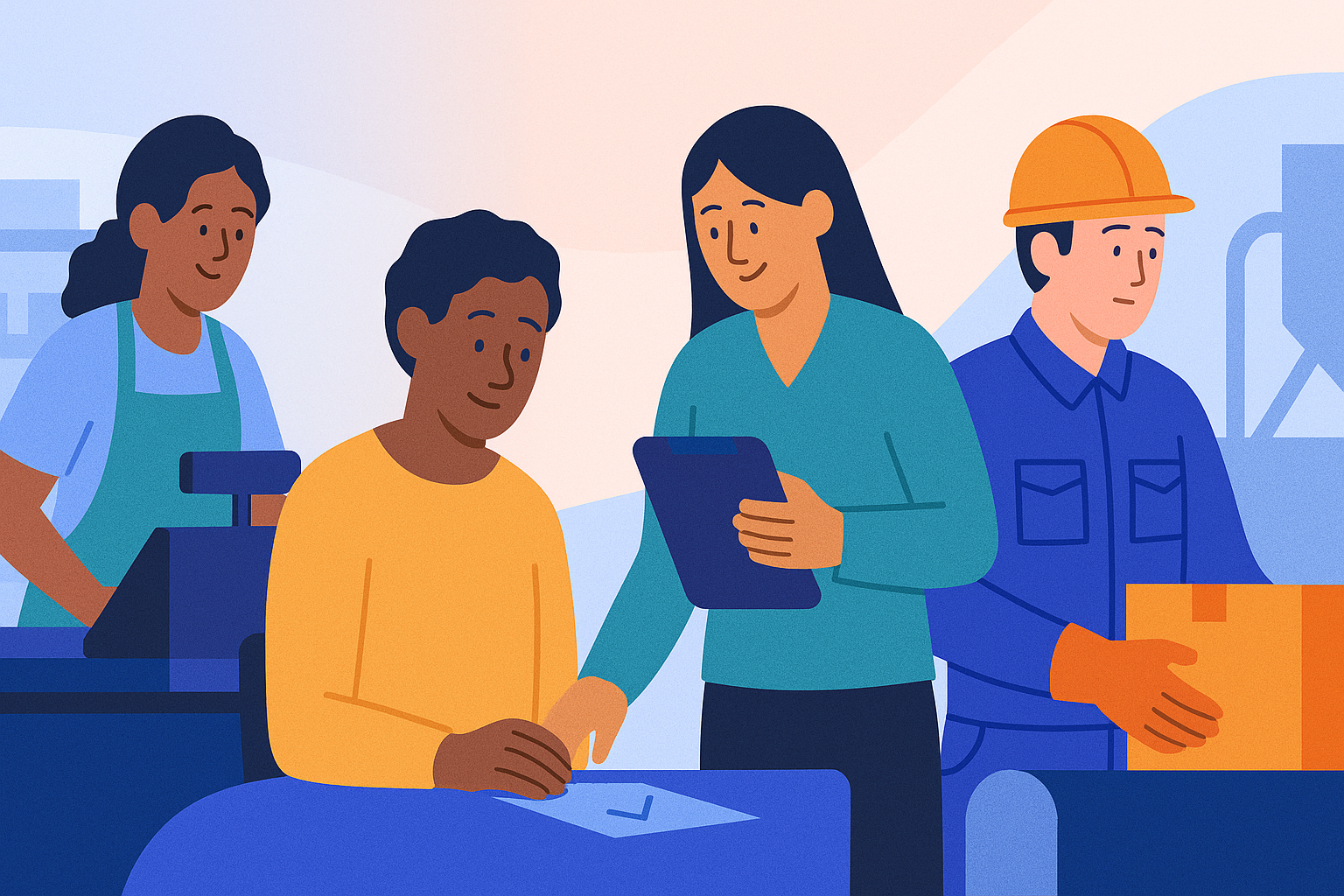Product
Solutions
Resources



Most conversations about workplace accommodations assume an office environment: desks, laptops, flexible scheduling, and digital workflows. But in industries like hospitality, retail, and manufacturing, accommodations play out on shop floors, in restaurants, on factory lines, or in customer-facing roles. These workplaces add complexity because operations are often shift-based, physically demanding, and tightly scheduled.
Understanding these differences is critical for compliance under the ADA and PWFA, and for ensuring employees can do their jobs safely and effectively.
In an office, accommodations might look like remote work, flexible hours, or ergonomic adjustments. In shift-based industries, however, accommodations often involve schedule changes, shift swaps, or duty modifications.
Employers must balance:
Documenting and standardizing the interactive process is vital — it allows employers to show that they explored effective solutions, such as splitting duties, adjusting break schedules, or providing temporary reassignment.
Hospitality, retail, and manufacturing jobs often involve standing for long periods, lifting, repetitive motions, or exposure to heat/cold/noise. This makes accommodations more likely to involve:
Unlike office environments where accommodations may focus on digital or administrative tools, in shift-based workplaces the emphasis is on job redesign and safe workflow adjustments.
Shift-based industries also hire at high volume, often for entry-level roles. That makes accommodation requests during the hiring and onboarding process more common. Examples include:
Employers must remember that ADA and PWFA obligations start at the candidate stage, not just after someone is hired. A standardized process helps recruiters and managers handle requests consistently, even during peak hiring seasons.
In office settings, a manager might have flexibility to let an employee shift hours or work from home. But on a factory floor or in a hotel, there is often no such option. Instead, employers must design accommodations within operational limits — while still engaging in the interactive process in good faith.
This makes it even more important to separate medical information from scheduling/managerial communications, document each step, and train supervisors to escalate requests quickly instead of handling them informally.
Disclo provides a platform to standardize accommodations across both office and shift-based environments. For hospitality, retail, and manufacturing, it means:
By providing structure, Disclo helps employers balance compliance, employee needs, and operational realities — whether in the back office or on the front line.
Disclaimer: This article is for general information only and not legal advice. Always consult counsel for advice on your specific situation.



Managing accommodations looks different in hospitality, retail, and manufacturing compared to office settings. Here’s how employers can adapt.
Most conversations about workplace accommodations assume an office environment: desks, laptops, flexible scheduling, and digital workflows. But in industries like hospitality, retail, and manufacturing, accommodations play out on shop floors, in restaurants, on factory lines, or in customer-facing roles. These workplaces add complexity because operations are often shift-based, physically demanding, and tightly scheduled.
Understanding these differences is critical for compliance under the ADA and PWFA, and for ensuring employees can do their jobs safely and effectively.
In an office, accommodations might look like remote work, flexible hours, or ergonomic adjustments. In shift-based industries, however, accommodations often involve schedule changes, shift swaps, or duty modifications.
Employers must balance:
Documenting and standardizing the interactive process is vital — it allows employers to show that they explored effective solutions, such as splitting duties, adjusting break schedules, or providing temporary reassignment.
Hospitality, retail, and manufacturing jobs often involve standing for long periods, lifting, repetitive motions, or exposure to heat/cold/noise. This makes accommodations more likely to involve:
Unlike office environments where accommodations may focus on digital or administrative tools, in shift-based workplaces the emphasis is on job redesign and safe workflow adjustments.
Shift-based industries also hire at high volume, often for entry-level roles. That makes accommodation requests during the hiring and onboarding process more common. Examples include:
Employers must remember that ADA and PWFA obligations start at the candidate stage, not just after someone is hired. A standardized process helps recruiters and managers handle requests consistently, even during peak hiring seasons.
In office settings, a manager might have flexibility to let an employee shift hours or work from home. But on a factory floor or in a hotel, there is often no such option. Instead, employers must design accommodations within operational limits — while still engaging in the interactive process in good faith.
This makes it even more important to separate medical information from scheduling/managerial communications, document each step, and train supervisors to escalate requests quickly instead of handling them informally.
Disclo provides a platform to standardize accommodations across both office and shift-based environments. For hospitality, retail, and manufacturing, it means:
By providing structure, Disclo helps employers balance compliance, employee needs, and operational realities — whether in the back office or on the front line.
Disclaimer: This article is for general information only and not legal advice. Always consult counsel for advice on your specific situation.

